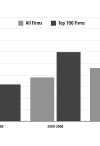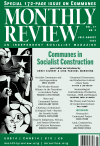
September 2025 (Volume 77, Number 4)
In order to understand the crisis of the imperialist world system in the twenty-first century,” MR editors write in this month’s “Notes from the Editors,” “it is crucial to see this in terms of the present as history, that is, as an outgrowth of a centuries-long historical process.” Following this thread from the long sixteenth century through to the present day, the editors dissect the material conditions leading the emergence to a new and decidedly anti-imperialist revolutionary subject. | more…

Power, Control, Inequality, and Democracy in the Twenty-First Century
Jayati Ghosh illuminates how capitalism has exacerbated inequality not only due to market forces, but as a result of how wealthy countries and firms based within them have tilted the scales toward themselves, disenfranchising the rest of the world in the process. This pervasive economic inequality, Ghosh concludes, undermines the idea and practice of true democracy. | more…

The Grammar of Resistance: Rethinking Palestine Beyond Pity and Fear
In this interview, published here for the first time in English, Abdaljawad Omar (aka Abboud Hamayel) and Pascual Liguori discuss Western media attempts to force upon Palestinians narratives of either victimhood or savagery. These portrayals, however, only obscure the threat Palestinian resistance poses not just to Zionism, but to the colonial project globally. | more…

Neocolonialism through Debt: How French and U.S. Banks Underdeveloped Haiti
In 2003, Haitian president Jean-Betrand Aristide publicly called for France to pay reparations to Haiti—and less than a year later, was whisked away from the island via U.S. military aircraft. Steve Cushion sheds light on the colonial and neocolonial relationships that have imposed crushing debt on Haiti and its people, and their continuing implications for Haiti’s development. | more…

Gogol’s Nose: On the Scent of Our Times
Andy Merrifield explores Nikolai Gogol’s short story “The Nose,” a satirical tale featuring a puffed-up government official who finds himself suddenly and nose-less. As the official pursues his formerly attached schnozz through the streets of St. Petersburg, Gogol bestows upon readers a twisted parable revealing the pettiness and indolence pervading the corridors of power. | more…

Black Scare in California: Blacks, Reds, and Revolution in the 1960s and ’70s
Blacks, Reds, and Revolution in the 1960s and '70s
Joel Wendland-Liu reviews Armed Struggle?, Gerald Horne’s exploration of the state violence and repression that were successfully employed to demolish the Black Panther Party and its influence throughout the 1960s and ’70s. Though Horne’s recounting, Wendland-Liu writes, we can take powerful lessons about the roles of race and class in the militant drive toward liberation. | more…

Freedom and Economics
“Assume a ship under the command of a mad captain headed for certain shipwreck. What would freedom mean to the people on board?” asked MR cofounder Paul M. Sweezy in this previously unpublished discussion piece. “There can hardly be any doubt about the answer…the essence of freedom for the people on the ship is the ability to control their collective fate.” | more…

July-August 2025 (Volume 77, Number 3)
This month’s “Notes from the Editors” discusses the accelerating progress of China toward sustainability. China’s decline in carbon emissions and rapidly decarbonizing energy sector demonstrates the importance of societal realignment and extensive planning to shift toward the ecological modernization that has continued to elude monopoly-capitalist regimes. | more…

A Special Issue on Communes in Socialist Construction
Inspired by the Venezuelan project of building socialism via the commune, this special issue looks at attempts to use communal models in socialist projects in a range of different contexts, as well as the theoretical bases for such an endeavor. In their introduction, guest editors Chris Gilbert and Cira Pascual argue that the theme of Communes in Socialist Construction is an important opportunity for engaged Marxist reflection of a kind that offers valuable contributions to the universal body of socialist thought. | more…

Venezuela’s Communal Project
Ángel Prado, a founder of El Maizal Commune and Minister of Communes since 2024, discusses Venezuela’s communal project as both a response to urgent material needs and a long-term strategy for building socialism. Drawing on his experience as a grassroots organizer, he explores how communes are structured, how they relate to the state, and how they embody a vision of popular power. He also reflects on the need for unity within the Chavista movement. | more…

Socialist Communes and Anti-Imperialism: The Marxist Approach
Chris Gilbert proposes to answer the question: When is a socialist commune anti-imperialist? His response follows Karl Marx’s line of thought, looking at the latter’s approach to the commune from the Grundrisse through his late notes and letters on rural communes. After reconstructing the Marxist communal strategy, Gilbert argues that real-world projects in Venezuela, Bolivia, and Brazil in recent times conform to this overall Marxist approach, combining communal construction with an anti-imperialist drive for national liberation. | more…

The Worker-Peasant Alliance in the Transition to Socialism Today
Prabhat and Utsa Patnaik consider the historical views of the relationship between the proletariat and peasantry during the revolutionary transition to socialism and struggle against imperialism. While other thinkers have suggested that alliances between the two groups must be shed in order to complete the revolution, the Patnaiks propose a framework of voluntary cooperatization benefiting all. | more…

Marx and Communal Society
In this innovative study, John Bellamy Foster gets to the heart of Marx’s writing on communal societies—an aspect of Marx’s work that is often overlooked, despite its importance to the socialist project. Tying together Marx’s studies of anthropology, history, and ethnology, Foster illuminates the centrality of communalism to Marx’s overall critique of class-based societies. | more…